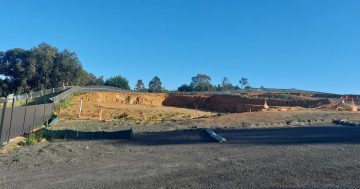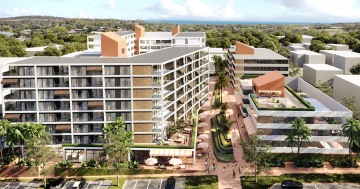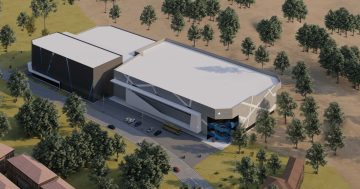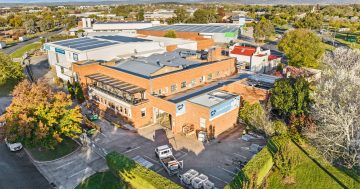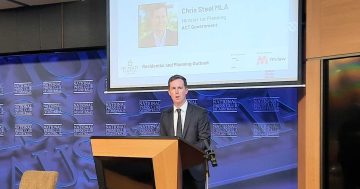
An artist’s impression of The Foothills. Construction could be delayed by a year. Photo: Doma Group.
One of Canberra’s biggest inner city residential projects is on hold after finance for the development fell through, leaving off-the-plan buyers in limbo.
Canberra developer Doma Group has told buyers of apartments and townhouses in the first three stages of its Foothills development in Campbell that this meant any further construction was unlikely to happen before the end of 2023, pushing the completion dates out to late 2025.
In a statement, Doma said the project had been hit by a combination of approval delays and the cost blowouts being faced by the industry, and it had been unable to secure finance for the development as it now stood.
It said that since the first stage of The Foothills had been released to the market at the start of 2020, building costs including the price of raw materials had risen by nearly 25 per cent while development, environmental and heritage approval processes were undertaken.
“Cost escalation in off-the-plan developments is generally allowed for by developers but the delays coupled with unusually high escalation that the whole industry has experienced in the last two years, has made management of this risk impossible for components of this development,” Doma said.
“Infrastructure works, funded by Doma, will be completed on the site and then there will be a pause while the situation is assessed.”
Doma said the delays would also render the current sunset clauses within the existing sale contracts unacceptable to the project financier and would need to be extended.
It did not say if it had cancelled contracts or offered buyers the option of rescinding them.
“Doma are now reassessing delivery options for The Foothills and will provide a further update to buyers by the end of the first quarter of 2023, it said.
The company said The Foothills was the only Doma development affected and was the result of the “long history of delays on site which have been well documented in the past”.
Aboriginal heritage claims about the site dogged the development.
Ngambri man Shane Mortimer claimed the site was culturally significant and was a men’s business site connected with toolmaking, forcing a federal Environment Department review of the development’s approval in 2020.
The next year Doma commissioned a new cultural heritage study involving consultation with registered Aboriginal organisations in Canberra.
That study cleared the way for the project but it meant significant delays just as the construction industry was hit with supply chain issues due to the pandemic and the rising cost of materials.
All up, Doma plans to build 252 dwellings on the prime Limestone Avenue site, formerly occupied by the CSIRO.
Last month it lodged a works approval application with the National Capital Authority for the final stage of the development which will contain 40 large, high-end townhouses, eight more than originally planned, along with a change in layout.
Doma bought the site in 2016 for $20 million.
It is not the only developer facing cost blowouts and having to review their projects and contracts.
ACT Property Council Acting Executive Director Ross Grove said construction costs projected pre-COVID could not reasonably anticipate the changes seen in the last two years.
“With this in mind it is reasonable to expect that projects and their input costs are reviewed on an ongoing basis in response to a changing economic landscape,” he said.
Mr Grove said the industry faced a time of unprecedented cost escalation with disrupted global supply chains meaning there is less construction material at a higher cost.
He said the recent weather events and short supply of skilled labour only exacerbated the challenge.












